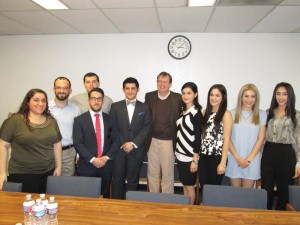
Tadeh Issakhanian
Staff Writer
Students and faculty were given a unique opportunity on Sunday, March 6 to meet and speak with the current U.S. Ambassador to Armenia Richard Mills. The Armenian Studies Program faculty and several members of the Armenian Students Organization had a once in a lifetime opportunity to sit down with the Ambassador and discuss a range of topics concerning Armenia and the work Ambassador Mills is doing in the region.
The Ambassador began his meeting with the students by first identifying his four main priorities: to work towards the building of bilateral economic ties between the U.S. and Armenia, partnering with Armenia to fight corruption, developing and strengthening civil society, and better explaining U.S. foreign policy to the people of Armenia. Of these four priorities the Ambassador focused on two in particular, the first being the prevalence of corruption within Armenia and the negative impacts this has on all aspects of the country. The focus for the Ambassador is to help Armenia develop and strengthen democracy and democratic institutions in Armenia in order to allow these bodies to have the technology, resources, and political will needed to attack corruption.
The second priority the Ambassador expanded on was the need for better explanation of U.S. foreign policy to the people of Armenia. He explained that many times due to media influences and a general lack of exposure and knowledge to U.S. foreign policy from U.S. sources, the people of Armenia often don’t have an accurate understanding of what the U.S. position and involvement is in the region and around the world. Ambassador Mills expressed that this is something that needs to be addressed through his office and that the burden of better explaining U.S. policy to the people of Armenia falls on his shoulders.
Near the end of the meeting with Ambassador Mills, students asked questions on topics related to Armenia. The questions ranged from the booming tech industry in Armenia, to Russian/Armenian relations and their impact on U.S. diplomacy. Students also brought up Genocide related questions focusing on the President’s unwillingness to use the word Genocide and the impact the students felt this had both on Armenia and the region. The Ambassador graciously addressed each question and provided the students with first hand insight into the U.S. State Department’s and President Obama’s stances on these topics.
It was a great experience for the students to have the opportunity to meet with Ambassador Mills and be exposed to the goals, the policy, and the thinking behind numerous aspects of U.S.—Armenia relations.
The Ambassador joined the students, faculty, and donors later that evening at the Armenian Studies Program 28th Annual Banquet where he again emphasized his priorities for Armenia and commended the work the Armenian Studies Program has done at Fresno State.
Richard Mills was nominated by President Barack Obama in July of 2014 to be the U.S. Ambassador to Armenia. Prior to his appointment, Ambassador Mills spent twenty plus years as a Foreign Service Officer in a number of different capacities throughout the world, beginning in 1988 in Paris as a consular officer and staff assistant to then U.S. Ambassador to France Walter Curley. From there, he was appointed as a Foreign Service Officer in Dublin, the United States Mission to the United Nations in New York, Islamabad, Riyadh, London, Baghdad and Valletta. Most recently, prior to his nomination as Ambassador to Armenia, Ambassador Mills served as the Deputy Chief of Mission at the U.S. Embassy in Beirut, a post he held from 2012–2014.
 Hye Sharzhoom Armenian Action
Hye Sharzhoom Armenian Action